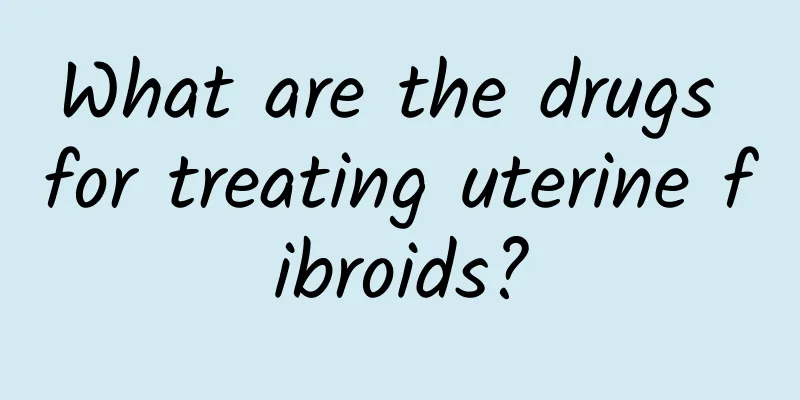What are the drugs for treating uterine fibroids?

|
Treatments for uterine fibroids include medication, surgery, and other adjuvant treatments. The specific choice depends on the size, location, symptoms, and fertility requirements of the fibroids. Medication is mainly used to relieve symptoms and control fibroid growth. The following three drugs are common and effective. 1 Hormone drugs The main function of hormone drugs is to regulate hormone levels in the body, thereby inhibiting the growth of fibroids. Common drugs include: Gonadotropin-releasing hormone agonists (GnRH agonists): such as leuprolide. This type of drug induces a "pseudo-menopause" state by lowering estrogen levels, thereby reducing the size of fibroids. However, long-term use may cause osteoporosis and is generally used for preoperative preparation or short-term treatment. Progesterone receptor antagonists: such as ulipristal acetate, can regulate the response of fibroid tissue to estrogen, while relieving symptoms such as excessive menstrual bleeding, and are suitable for long-term use in some patients. 2 Non-hormonal drugs Non-hormonal drugs are mainly used to improve symptoms caused by uterine fibroids, including: Hemostatic drugs: such as tranexamic acid, which is used for patients with excessive menstrual bleeding. It has obvious short-term hemostatic effect, but does not affect the fibroids themselves. Nonsteroidal anti-inflammatory drugs (NSAIDs): commonly used to relieve pain and menstrual discomfort caused by fibroids, such as ibuprofen. They are suitable for short-term symptom control, but gastrointestinal side effects should be noted. 3. Traditional Chinese medicine and other new drugs Some Chinese medicines are effective in relieving the symptoms of uterine fibroids and assisting in treatment, but the treatment mechanism is relatively complex and needs to be used under the guidance of a physician. For example, Guizhi Fuling Pills and Bazhen Yimu Decoction can help regulate endocrine and improve microcirculation. New drugs such as lactic acid oral capsules are also gradually being used in clinical practice, but they need to be fully evaluated before use. For drug treatment, patients need to make a comprehensive choice based on their own situation and the doctor's advice. If the symptoms of fibroids are severe, the desire for fertility is obvious, or the drug effect is limited, more active methods such as surgery and interventional treatment may be needed. Avoid buying medicine on your own or over-reliance on a single treatment method. Drug treatment for uterine fibroids can not only help control the progression of fibroids, but also relieve symptoms such as bleeding and pain. The selection of an appropriate treatment plan must be carried out under the guidance of a professional doctor, and regular review of fibroid changes should be conducted to ensure the safety and efficacy of treatment. If symptoms are significantly aggravated or drug treatment is ineffective, other intervention measures should be used in a timely manner to control the condition. |
<<: Can I take a bath if I have abnormal leucorrhea?
>>: Can I have an abortion if I am pregnant with uterine fibroids?
Recommend
Experts explain to you the relevant knowledge of Candida vaginitis
Candidal vaginitis is a gynecological disease cau...
How much do you know about cervical erosion?
Cervical erosion is one of the common gynecologic...
How to Treat Pelvic Inflammatory Disease Based on Syndrome Differentiation in Traditional Chinese Medicine
According to traditional Chinese medicine, pelvic...
Different types of female vaginitis symptoms lead to different characteristics of leucorrhea
Different conditions can cause different symptoms...
Let’s find out what are the causes of spontaneous abortion?
There are five reasons for spontaneous abortion. ...
Patients with pelvic inflammatory disease should promptly detect their symptoms
The occurrence of pelvic inflammatory disease wil...
How long does it take to recover from an abortion?
It usually takes about 30 days to recover from an...
Does cervicitis hurt?
Whether cervicitis will cause pain depends on the...
How much does it cost to treat pelvic peritonitis?
Female friends are very familiar with pelvic peri...
Cost of treating chronic menopause
How much does menopause cost? This is a question ...
Treatment steps for cervical precancerous lesions
Cervical precancerous lesions have become the big...
What is uterine fibroids with nodules? Is uterine fibroids with nodules serious?
What is uterine fibroids with nodules? Is uterine...
What does progesterone mean during menopause?
During laboratory tests, the progesterone test re...
What are the causes of irregular menstruation?
Many friends do not pay much attention to irregul...
Slimming and pressing 2 acupoints to suppress appetite and burn fat
Most people don’t really know which acupoints are...









